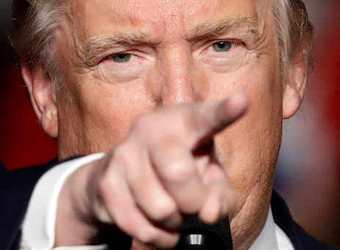U.S. President Donald Trump’s victory may have galvanised conservatives and struck fear in the hearts of his political foes, but it has also inspired a whole new generation of women to seek elected office in droves.
Since his election, Emily’s List, a political action committee which recruits and promotes pro-choice, Democratic women candidates, has reported that over 4,000 women across the country have sought guidance from them on running for office.
For some perspective, that’s quadruple the number of requests they got over the past 22 months combined, with 1,660 appeals from would-be candidates coming in since Inauguration Day.
Meanwhile, on Saturday afternoon, VoteRunLead, a 2-year-old national non-profit organisation, which provides resources and guidance for women breaking into politics, will be hosting a “This is How You Run for Office” seminar online at 4 p.m. EST.
Minnesota lawmaker Ihlan Omar, the first Somali-American female legislator in U.S. and a veteran of VoteRunLead, will be among the influential figures leading the tutorial.
“People really want to know how they can directly effect their communities,”Daneya Esgar, a Colorado state representative who will also be participating in the seminar, told NBC News, adding: “I want to encourage any woman who is thinking about it to jump in. Everyone deserves a chance to run for office.”
According to Erin Vilardi, the founder and CEO of VoteRunLead, the organisation has seen 20 times exponential growth in engagement and enthusiasm since the election- with the massive, global women’s marches in January 21 in particular providing a vital motivating moment for the movement to achieve more gender parity in all levels of government.
“The election was a shock to the system. The boon to the system was the women’s march,” Vilardi told NBC News.
“That very visible outpouring of support from women and men has people saying, ‘If this guy can run for president with no qualification, then I can definitely run for city council,'” Vilardi further stated.
Vilardi predicts that over the thousands of potential candidates her organization has been in contact with, at least a third already plan to seek office in 2018, which she predicts could be another “year of the women” akin to the historic 1992 cycle when four freshman female U.S. senators were elected.
Some women aren’t even waiting that long, with several running for city council and suburban county legislature seats this year.
Currently, several of the sitting women in the Senate have been some of the most outspoken opponents of Trump and his agenda, whether it be New York Sen.
Kirsten Gillibrand, who has opposed all of his Cabinet nominees, or Sen. Elizabeth Warren, who was recently silenced by her GOP colleagues for trying to read a letter from Coretta Scott King critical of Attorney General Jeff Sessions into the Senate record.
And on the Republican side of the aisle, Sen. Susan Collins of Maine and Sen. Lisa Murkowski of Alaska very nearly derailed the polarizing education secretary pick Betsy DeVos, and their defections forced Vice President Mike Pence to make a historic tie-breaking vote to validate her nomination.
“I think it’s amazing. I feel like we’re at the beginning of a movement,” said Melanie McEvoy, an event coordinator for the New York-based Eleanor’s Legacy, which helps train women and fundraise for female candidates statewide.
“Women are visibly upset about the current administration and the rollbacks we’re already seeing and feeling on women’s rights.”
She too has seen a surge of women- of all didn’t ages, ethnicities and economic backgrounds- wanting to protest, seeking an opportunity to affect change, ever since Election Day.
Meanwhile, she said there is a lot of anger and sadness over how the election played out and how Democratic nominee Hillary Clinton was treated, McEvoy sees a renewed optimism.
“People seem just really energized, so far the fatigue hasn’t kicked in,” said McEvoy. “What I’m seeing multiple opportunities for women to engage. Women come from a different perspective, we prioritize things first that other people don’t.”
“Women are solution oriented. They don’t come into politics because they want to be a senator, they come to politics because they have an issue in their community and they want to get something done,” added Vilardi.
That doesn’t mean that their task is not daunting. A majority of white womenvoted for Donald Trump (although women nationally give him very low marks) and Clinton’s defeat (although she handily won the popular vote) came despite her having vastly more experience in government than her opponent.
And yet these women have “persisted.”
“The feeling is not so much one of disenchantment, as it’s I’ve got to pay attention to my local government,” said Esgar.
“The election is leaving a lot of people wondering ‘Why?’ The women I’ve been in contact with, they see what’s happening on a national scale, it’s something that is sparking a fire,” Esgar said.
According to Esgar, more and more women are starting to say: “I have solutions for that, why don’t I stand up and why don’t I speak out?”
Source: NBC news
